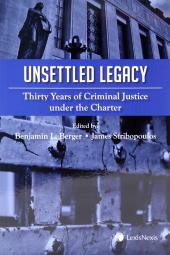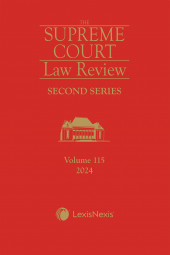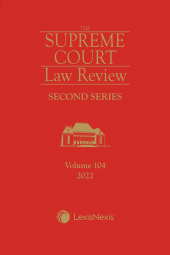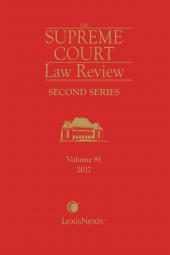Unsettled Legacy: Thirty Years of Criminal Justice under the Charter
One Year Subscription Only Terms
Subscribers receive the product(s) listed on the Order Form and any Updates made available during the annual subscription period. Shipping and handling fees are not included in the annual price.
Subscribers are advised of the number of Updates that were made to the particular publication the prior year. The number of Updates may vary due to developments in the law and other publishing issues, but subscribers may use this as a rough estimate of future shipments. Subscribers may call Customer Support at 800-833-9844 for additional information.
Subscribers may cancel this subscription by: calling Customer Support at 800-833-9844; emailing customer.support@lexisnexis.com; or returning the invoice marked 'CANCEL'.
If subscribers cancel within 30 days after the product is ordered or received and return the product at their expense, then they will receive a full credit of the price for the annual subscription.
If subscribers cancel between 31 and 60 days after the invoice date and return the product at their expense, then they will receive a 5/6th credit of the price for the annual subscription. No credit will be given for cancellations more than 60 days after the invoice date. To receive any credit, subscriber must return all product(s) shipped during the year at their expense within the applicable cancellation period listed above.
Détails des produits
After thirty years, what effect has the Charter had on the justness of the Canadian criminal justice system? This thought-provoking collection of essays by a group of leading criminal law scholars explores that very question, critically examining the ways in which the Charter has shaped Canadian criminal law and its administration.
Edited by Professors Benjamin L. Berger and James Stribopoulos of Osgoode Hall Law School, these criminal law essays offer insight into every facet of the Charter's influence over how crimes are defined, investigated and prosecuted. The result is an invaluable resource for scholars, practitioners and judges interested in criminal justice in Canada.
Features and Benefits
- Essays in this unique collection authored by Canada's leading criminal constitutional scholars
- Analysis of all aspects of the Charter's impact on the Canadian criminal justice system, from the legislative process to the imposition of a sentence
- A detailed table of contents ensuring easy access to key concepts and ideas
What You'll Find in This Volume
- Expert analysis of historic and current trends in criminal constitutional law
- Penetrating insights into the Charter's effects on how crimes are defined, investigated and prosecuted
- In-depth analysis of the Charter's strengths and weaknesses, including a critical evaluation of its effects on indigenous peoples, racialized minorities and victims of sexual violence
Who Should Read This Book
- Defence lawyers - Gain an understanding of the promise and limits of the Charter in our criminal justice system to better serve your clients
- Crown prosecutors - Appreciate the historical and thematic trends in Charter jurisprudence on criminal justice to help in the search for balance between Charter claims and the public interest
- Judges and academics - Engage with the reflections of leading criminal justice scholars critically examining the Charter's impact and contemplating future trends in the criminal justice system
- Human rights advocates - Better equip yourself to assist those who continue to remain largely on the margins of the Canadian criminal justice system, including indigenous peoples, victims and racialized minorities
Table des matières
Part I: Introduction
Benjamin L. Berger and James Stribopoulos
Part II: The Justness of Criminal Justice in Canada After 30 Years with the Charter
Three papers contributed by: Don Stuart, Rosemary Cairns-Way & Kent Roach
Part III: Substantive Criminal Law and its Limits
Five papers contributed by: Alana Klein, Alan Young, Gerry Ferguson, Debra Parkes & Allan Manson
Part IV: Due Process and its Limits
Four papers contributed by: Steve Coughlan, Vanessa MacDonnell, Lisa Dufraimont & Steven Penney
Part V: Gender Violence and Sexual Assault
Three papers contributed by: Emma Cunliffe, Michael Plaxton & Martha Shaffer
Part VI: Race, Culture, and Diversity
Four papers contributed by: Carissima Mathen, Jonathan Rudin & Larry Chartrand
 Lexis Nexis
Lexis Nexis 


